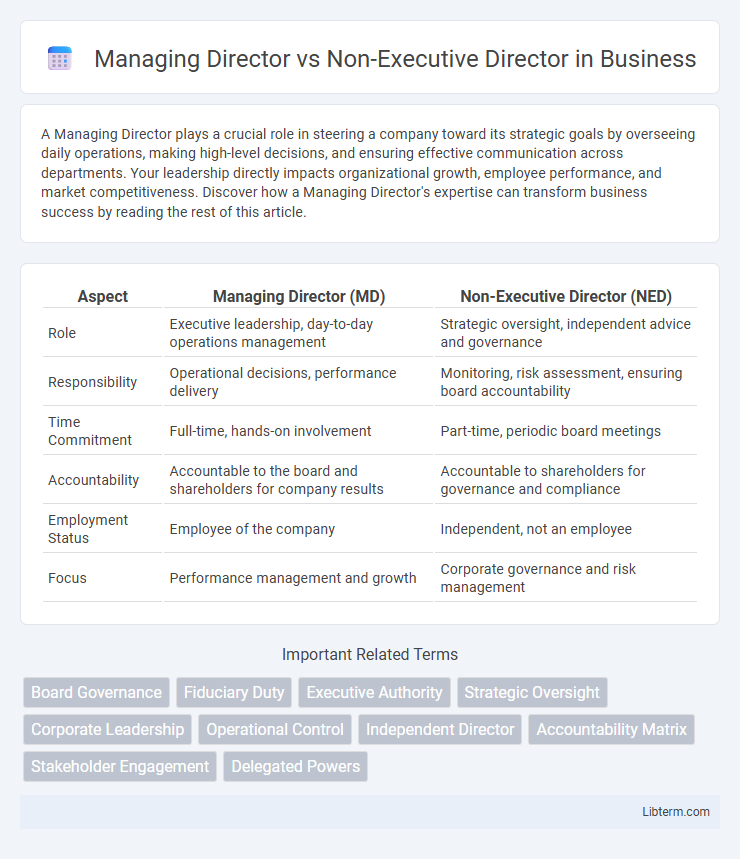A Managing Director plays a crucial role in steering a company toward its strategic goals by overseeing daily operations, making high-level decisions, and ensuring effective communication across departments. Your leadership directly impacts organizational growth, employee performance, and market competitiveness. Discover how a Managing Director's expertise can transform business success by reading the rest of this article.
Table of Comparison
| Aspect | Managing Director (MD) | Non-Executive Director (NED) |
|---|---|---|
| Role | Executive leadership, day-to-day operations management | Strategic oversight, independent advice and governance |
| Responsibility | Operational decisions, performance delivery | Monitoring, risk assessment, ensuring board accountability |
| Time Commitment | Full-time, hands-on involvement | Part-time, periodic board meetings |
| Accountability | Accountable to the board and shareholders for company results | Accountable to shareholders for governance and compliance |
| Employment Status | Employee of the company | Independent, not an employee |
| Focus | Performance management and growth | Corporate governance and risk management |
Understanding the Role of a Managing Director
A Managing Director (MD) is responsible for the daily operations and overall management of a company, ensuring that strategic objectives are implemented effectively. Unlike Non-Executive Directors who provide independent oversight and governance without engaging in daily operations, the MD actively leads executive teams and drives business performance. Understanding the role of a Managing Director highlights their accountability for operational decisions, resource allocation, and achieving profitability targets within the corporate structure.
Defining the Non-Executive Director Position
The Non-Executive Director (NED) position is defined by its role in providing independent oversight and strategic guidance without involvement in daily management. Unlike Managing Directors who handle operational responsibilities, NEDs focus on monitoring executive decisions, ensuring accountability, and contributing to corporate governance. Their presence strengthens board objectivity, risk management, and long-term value creation for shareholders.
Key Differences Between Managing and Non-Executive Directors
Managing Directors hold executive responsibilities, actively overseeing daily business operations and strategic implementation within a company. Non-Executive Directors provide independent oversight and governance, focusing on monitoring performance, advising on policy, and ensuring compliance without direct involvement in day-to-day management. Key differences include the scope of authority, with Managing Directors involved in operational decisions, while Non-Executive Directors prioritize accountability and stakeholder interests.
Core Responsibilities of a Managing Director
A Managing Director oversees daily operations, implements company policies, and drives strategic growth, ensuring alignment with organizational goals. They hold executive authority to make key decisions, manage resources, and lead the management team to achieve performance targets. In contrast, Non-Executive Directors primarily provide independent oversight, governance, and strategic advice without engaging in day-to-day management.
Primary Duties of a Non-Executive Director
Non-Executive Directors primarily oversee company strategy and performance, providing independent judgment on issues of strategy, performance, and risk management. They ensure effective governance by monitoring executive management, safeguarding shareholder interests, and contributing to board committees such as audit, remuneration, and nominations. Their role involves offering objective oversight without involvement in daily operations, thereby promoting transparency and accountability within the boardroom.
Decision-Making Authority: MD vs NED
The Managing Director (MD) holds executive decision-making authority, responsible for day-to-day operations and implementing company strategy. In contrast, a Non-Executive Director (NED) provides independent oversight, offering strategic guidance without engaging in daily management or operational decisions. The NED's role centers on governance, risk assessment, and ensuring the board's accountability rather than direct control over business execution.
Boardroom Influence and Strategic Impact
Managing Directors hold executive authority, driving day-to-day operations and executing board-approved strategies, which grants them substantial influence in shaping corporate direction. Non-Executive Directors provide independent oversight, challenge management decisions, and contribute to strategic governance without engaging in daily management. The dynamic between these roles balances operational execution with objective scrutiny, enhancing boardroom effectiveness and long-term organizational success.
Regulatory and Legal Obligations
Managing Directors hold executive responsibilities, actively overseeing company operations and making strategic decisions, which subjects them to fiduciary duties under corporate law and regulatory requirements such as financial reporting and compliance with employment laws. Non-Executive Directors primarily provide independent oversight and governance without day-to-day involvement, carrying legal obligations to monitor management performance and ensure adherence to statutory duties under regulations like the UK Corporate Governance Code. Both roles demand compliance with securities laws, director duties under the Companies Act 2006, and anti-corruption regulations, but Managing Directors face heightened accountability due to their operational control and executive functions.
Skills and Qualities for Each Director Role
A Managing Director requires strong leadership skills, strategic vision, and operational expertise to drive company performance and make executive decisions. Key qualities include effective communication, problem-solving abilities, and the capacity to manage teams and resources efficiently. In contrast, a Non-Executive Director emphasizes oversight skills, independent judgment, and governance knowledge to provide objective advice and ensure regulatory compliance without engaging in daily operations.
Choosing the Right Director Role for Your Business
Selecting the right director role for your business depends on operational involvement and strategic oversight needs. A Managing Director assumes executive responsibilities, driving daily management and decision-making to achieve company objectives. In contrast, a Non-Executive Director offers independent governance, providing critical advice and monitoring without direct operational duties, ensuring balanced leadership and compliance.
Managing Director Infographic

 libterm.com
libterm.com